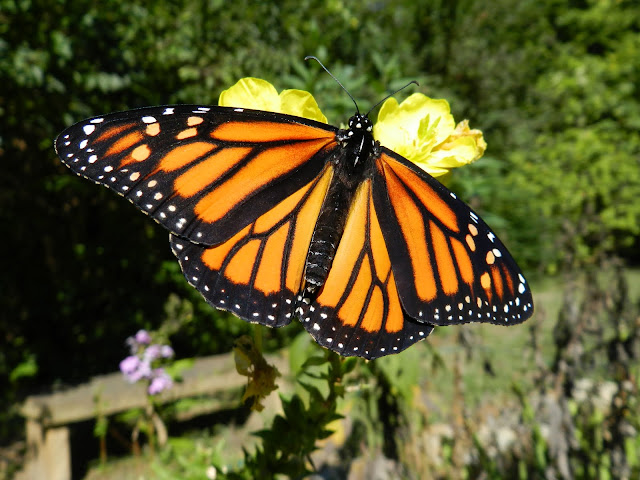Anyone who cares about the future of monarch butterflies has to have Honeyvine milkweed (Cynanchum laeve) where it can climb and provide vegetation required by monarch caterpillars. In Fayetteville, Arkansas, it may climb to 20 feet on some trees. But in late fall one can pluck the seed pods to save and cut down the skinny little vine. It will come up from its roots in April or May and bloom sometime in summer on the extreme ends. A place where I had previously found it on the edge of a thicket near a stream bank was brush-hogged for the first time in many years and voila' some honeyvines came up all through the patch of now denuded ground and many monarch caterpillars prospered on it and many made their way to the nearest remaining shrubs and trees to form chrysalises in late summer and flew south in early and mid fall. It may be considered invasive in some places, but I have not seen evidence that it strangles any woody vegetation it climbs. It dies back and has to regrow, while the Japanese honeysuckle and a few other non-native vines live through the winter and actually kill saplings after a few years. I wish it were able to survive the winter and keep growing, but not in this climate. Lonicera sempervirens, the native trumpet honeysuckle vine, Cynanchum laeve and passionflower vines are excellent choices of low-maintenance fence or tree-line plantings with incredible wildlife (especially native bees, native flower flies and butterflies) value. http://www.flickr.com/photos/7295307@N02/6429137355/in/photostream/
Sunday, December 18, 2011
Tuesday, December 13, 2011
Friday, December 9, 2011
Video added: Joe Neal introduces 'In the Province of Birds' at 7 p.m. Friday, December 9, 2011, at Nightbird Books on Dickson Street in Fayetteville AR
Hi Aubrey -- just wanted to let you know that Half Acre Press has a new book out from Joe Neal, In the Province of Birds, in case you'd like to mention it on your blog. There will be a booksigning and slideshow/bird talk by Joe at Nightbird Books on Friday, December 9 at 7 pm. Hope to see you there!
Thanks,
Liz
---------------------------------------------------
Liz Lester
479-236-0992
Liz Lester Design
lizlesterdesign@yahoo.com
www.lizlesterdesign.com
Half Acre Press
liz@halfacrepress.com
Please click on image to ENLARGE.
Thursday, December 8, 2011
World Peace Wetland Prairie volunteers receive certificate for work on city-owned, neighbohood-maintained park
Tuesday, December 6, 2011
Friday, December 2, 2011
Wednesday, November 30, 2011
Saturday, November 19, 2011
Flower, Garden and Nature Society to hear presentation by Steve Sampers, president of Northwest Arkansas Master Naturalists
Please click on individual images to ENLARGE for better view of Heirloom Italian arugala (Diplotaxis tenuifolia) with two individuals from different flower fly species nectaring and for easier reading of meeting announcement.
Friday, November 18, 2011
Coming winter makes protecting wild natural places important even in cities
Flower fly in fall an example of important pollinator whose habitat needs protection. Click on individual images to ENLARGE.
Thursday, November 17, 2011
Thursday, November 3, 2011
Sunday, October 23, 2011
Flower flies perform much like bees and many species look much like bees
Please click on individual images to ENLARGE October 22, 2011, photos of Syrphidae family member Helophilus sp.
 |
| To view many species of flower flies see http://www.cavette.net/photos/syrphids/ |
Friday, October 14, 2011
Tuesday, October 11, 2011
Fayetteville Environmental Action Committee meeting at 5:30 p.m. Thursday, October 13, 2011, agenda provided by John Coleman
Please click on individual images to ENLARGE. Click on enlargement for even closer view of tiny brown, hairy spider lurking on Ironweed at World Peace Wetland Prairie on October 9, 2011.
Monday, October 10, 2011
Fayetteville City Council approves OMNI Center donation of Hank Kaminsky sculpture to WPWP on September 6, 2011
Fayetteville park-board video below:
Fayetteville art-council video below:
Friday, October 7, 2011
Wednesday, October 5, 2011
If butterflies could vote (and other beneficial insects and all wildlife) Fayetteville's sales-tax renewal would pass ON CONDITION that park mowing would be reduced while most park and other city services would be increased
Please click on individual images to ENLARGE. Click on enlargement for closer view.
Beneficial insects depend on native plants through fall. Mowing or brushhogging or burning before winter decreases populations of these and many other valuable native species.
Beneficial insects depend on native plants through fall. Mowing or brushhogging or burning before winter decreases populations of these and many other valuable native species.
 |
| Clouded sulphur butterfly on Grindelia (gum plant) flower Oct. 4. 2011 |
 |
| Monarch butterfly caterpillar on Asclepias incarnata (swamp milkweed) Oct. 4, 2011) |
 |
| Monarch butterfly on Evening Primrose on Oct. 4, 2011, fresh from chrysalis ready to fly to Mexico for winter |
 |
| Rare fall flower on Aslcepias viridis (spider milkweed) Oct. 4, 2011, offering fresh leaves to last generation of monarch caterpillars |
 |
| Pearl crescent butterfly resting on plant long past flowering stage on Oct. 4, 2011 |
Subscribe to:
Comments (Atom)











































